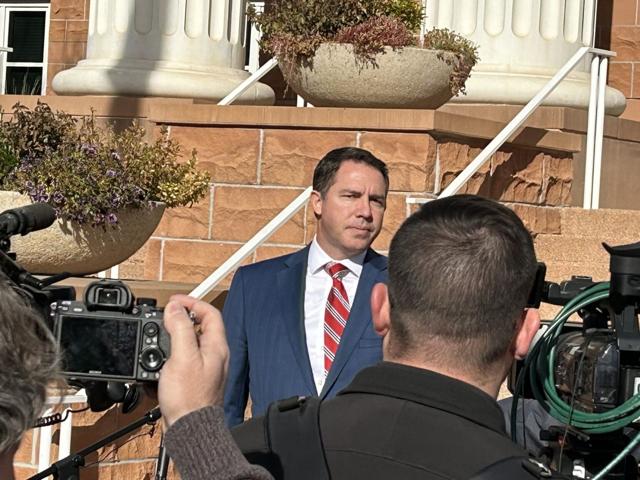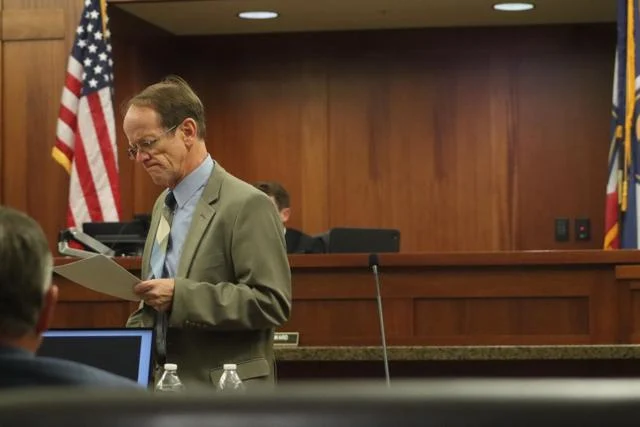
Editor’s note: This report contains frank language details of a sexual nature. reader discretion is advised.
The following story was written by Eric S. Peterson, Sydnee Chapman and Tracie Sullivan. The story was reported by The Utah Investigative Journalism Project in partnership with St George News.
“Jane” found herself in an impossible situation last fall. She was juggling a demanding job and raising a toddler as a single mom. In August 2024, she also found herself calling up the man she says sexually assaulted her on a recorded call while Cedar City police detectives stood nearby. She was supposed to get proof to use against him in court – police told her she needed some kind of a confession.
The Utah Investigative Journalism Project is not identifying the man alleged to have assaulted her, as prosecutors ultimately decided not to press charges against him. “Jane” is not the woman’s real name — her identity is being protected for the sake of her privacy and because she fears retaliation from the man she accused, who is a deputy with the Iron County Sheriff’s Office.
On the recorded call, Jane angrily confronted the deputy about what happened to her that night, how he threw her on the bed, pinned her down and assaulted her. But the deputy did not confess. Instead, Jane was shocked when he described the encounter as “playful” and that once he realized she did not want to have sex, he stopped — but not before ejaculating on her.
Since the case involved Iron County law enforcement, Jane’s case was investigated by Washington City Police and screened by the Washington County Attorney’s Office. In September 2024, prosecutors reviewed the investigative report and its evidence and declined to prosecute the case.
Jane then decided to record another call, this time to Ryan Shaum, the chief deputy prosecutor for the Washington County Attorney’s Office. She later provided a copy of this recording to The Utah Investigative Journalism Project.
Jane was angry and demanded to know why it wasn’t enough that she repeatedly told the deputy “no” over and over again before the assault.
Shaum repeated that he felt convinced by the deputy’s account of what happened: that the incident started out consensually and that he stopped when it was clear that she did not want to have sex. Shaum repeated the deputy’s account that although she said “no” from the beginning, the two were still kissing before the alleged assault. Jane denies this account.
“He said you were acting in a way that he believed you wanted more than to make out, or whatever, and so things continued that way until it was pretty clear you were not wanting to have sex and at that point he stopped,” Shaum said.
As Jane tried to challenge that account, Shaum added: “‘No’ is not a magical word.’”
Jane said the conversation with the prosecutor devastated her. Not only did she feel his lecturing tone and language was unprofessional but she was also shaken that prosecutors felt her word would not stand up against the deputy’s.
Jane provided The Utah Investigative Journalism Project the investigative report into her case that was also reviewed by prosecutors. While Shaum found the deputy’s account credible, the investigative report showed it was not simply a case of “he said/she said.” The document makes numerous references to the fact that the deputy likely knew he was being investigated and would not fall into the trap of confessing anything over the phone.
The 101st time she saw him
For a long time Jane felt safer knowing the deputy. She lived at the time about 15 minutes outside of Cedar City. She was a single mom “in the middle of nowhere” and having the deputy stop by every now and then on his patrol was reassuring. They had a brief romantic relationship that included two isolated sexual encounters more than a year prior. Jane said she did not like how “forceful” and “pushy” he was when it came to sex, so they settled on being friends.
In the investigative report, she noted that she had “seen him 100 times and there has never been an issue.” During that time, they hung out and bonded over both being young and divorced; their children even played together at a park once.
Jane said that all changed on Aug. 11, 2024. She texted him to come over after work because she wanted to talk to him about how she kept getting “loose animal” citations over her Rottweiler. She felt it was unfair and wanted to vent.
According to her account, the deputy was at her house for only 20 minutes and assaulted her within five minutes of showing up.
The two made small talk. She complained about her neighbor and all the other dogs running loose in the neighborhood while she was washing dishes in the sink. She was expecting her child’s father momentarily to pick her up and told the deputy she was going to take a shower. That’s when she said that he started “to fight to take her shirt off” then threw her on the bed.

The deputy had taken his pants off and had been rubbing his penis against her groin. She said while she was cursing at him and telling him to get off her, he instead kept rubbing against her. He tried to kiss her but she had closed her mouth. She also “was squeezing her legs closed” so strenuously “that her legs were just shaking,” according to her statement to police.
Jane said she loudly and clearly said no to all this as the deputy proceeded to pin her to the bed telling her that he knew that “she liked to be dominated.” She said she was partially penetrated but continued resisting so that the deputy instead ejaculated on her stomach.
She said he then “got up and laughed and said ‘thanks,’” before quickly leaving to go pick up his own son.
She said she didn’t sleep that night but kept replaying the incident over and over in her head.
A little after 6 the next morning she couldn’t take it and texted him, “Wanna know something?”
There was no response all day, she texted again at 3 p.m. to say, “I honestly am so mad at you for last night.” This time the deputy responded.
“Are you being serious or sarcastic? If you are being serious then I’m very sorry. I’m busy right now will call you tonight.”
Jane followed up by text to say: “I don’t wanna hook up and I’ve been clear on that. I told you no and I kept telling you no. I enjoy your company as my friend which is why I invite you over to just bullshit.”
Two minutes later the deputy responded. “I’m so sorry, it won’t happen again. I completely understand where you are coming from and will respect that friendship.”
The first recorded call
Jane felt she had no choice but to file an official complaint. She met with an investigator, had a rape kit collected and underwent a forensic interview. On Aug. 26, 2024, Jane called the deputy for the recorded call. The first time she called he couldn’t talk, and she said she would call back later in the evening.
Jane’s evidence file includes video of her calling the deputy at the Cedar City Police station. A detective tells her to just be herself before calling. She warns that that means she’s going to swear at him a lot. The detective tells her that’s fine. Jane’s voice is steady as she calls, but throughout the conversation she periodically flaps her shaking hands out to her sides trying to calm her nerves. The conversation quickly becomes combative as she presses the deputy on why he kept pushing when she said “no.”
The deputy is calm on the call saying “you were kissing me and pulling me in.” At this Jane can be seen making a shocked face to the detective.
“I thought it was playful and when I realized it wasn’t, I stopped right away,” the deputy said.
The deputy repeatedly asks that they should meet in person instead of talking on the phone.
“You have caused me anxiety to the max. I haven’t slept. I literally can’t close my eyes because I am so anxious,” Jane said. “Now you want to meet and act like it is all fine and dandy?”
The deputy was conciliatory to Jane’s feelings, at least initially, and stated that “he cared about her and indicated that he had been there for her in hard times,” and “that if he had hurt her trust he wanted to be able to do what he could to rebuild it.” But when Jane said what he did was rape, the deputy became more defensive. He asked if she was recording the call and worried about his job and losing custody of his son.
“I’m honestly freaking out,” he said in an even tone.
The detectives in the room tried to write out questions for Jane to use but Jane struggled to keep track of the notes while talking to the deputy at the same time. Twenty-three minutes into the call, one of the detectives coughed in the background and the deputy overheard and asked who was there. Jane played it off as best she could, but the conversation ended shortly thereafter.
Throughout the conversation the deputy apologized that she felt hurt but consistently said nothing when she said she had been raped. Neither did he challenge her when she said he didn’t stop and ejaculated on her.
“That’s not stopping, that’s degrading especially because I said ‘no,’” Jane said.
The interview
The deputy was suspicious when he heard the cough, but evidence from Jane’s police file indicates he may have been aware the call was a trap well before then.
That night, the deputy decided to call a detective in the Cedar City Police Department. The detective was later contacted by the Washington City Police detective investigating Jane’s case.
Their phone conversation was recorded and the Cedar City detective described how the deputy called him close to 10:30 p.m. that night and asked if he was being investigated. The detective told him not as far as he knew. While the deputy would not go into great detail about what he said was a “sensitive” matter, he described the call and the Cedar City detective told him it sounded like a controlled or “pretext call” as they are known to law enforcement.

The Iron County deputy agreed, explaining that “he had set them up himself in investigations.”
The day after the controlled call, the Washington City detective consulted with Washington County prosecutors who urged him to interview the deputy soon since “there was a high likelihood that he would learn of the investigation prior to being questioned.”
The prosecutors told them that if he wouldn’t sit for an interview they had enough probable cause with the text messages and Jane’s account “to arrest for rape and forcible sexual abuse.”
The very next day, the investigator arrived at the Iron County Sheriff’s Office with another detective and met the deputy in a conference room. A video recording of the meeting shows the deputy was initially calm but concerned. He decided against having a lawyer present, saying he had nothing to hide.
He described showing up at Jane’s place and finding her in a t-shirt and panties, “which was typical for her,” he said.
The deputy then explained that the foreplay was consensual and “playful” and when she made it clear that she did not want to have sex that he stopped. He acknowledged that he rubbed his penis on her vagina and masturbated and ejaculated on her but stressed that he did not penetrate her.
Early in the interview, he also stated to the detectives that he knew what the call was about.
“I know how this process works. She called me the other night and I’m assuming that was a recorded call,” the deputy said. “What she said in the call was not what happened and she was trying to get me to say that I raped her, which is not the case and I want to make that very clear.”
He was asked about the text message where he apologized to Jane after she repeatedly said no and did not want to “hook up.”
The deputy explained that Jane was saying she did not want to have sex because she would get emotionally attached to him and that was what she was upset about.
The interview lasted less than 20 minutes. The primary detective left to call prosecutors and get guidance. During the next half hour, the deputy anxiously waited and made small talk with the other detective. When the first detective returned with a warrant for DNA, the deputy was escorted out, complaining of stomach issues because of his anxiety. While the deputy was out of the room, the detectives discussed how after hearing his side of the story and speaking with the county attorney, they decided not to arrest him at the station.
When the deputy returned from the bathroom, he was sobbing. The Washington City detectives tried not to look at the deputy, who apologized for putting them in a difficult position.
The primary detective from Washington City consoled the deputy telling him, “I can’t imagine the stress you are going through.”
When the deputy tells him “It feels like a bad dream,” the detective investigating him replies: “Yeah, I haven’t been sleeping well.”
The deputy was placed on administrative leave, a DNA sample was collected, his county phone was taken and the investigators then left.
At the time of this report, the Washington City Police Department did not respond to a request for comment about the decision not to arrest the deputy.
Roughly a month later, the Washington County prosecutors decided not to press charges. The detective told Jane, “That’s not to say you are not validated” but that prosecutors reviewed all the evidence and decided they could not prove the case in court. But he told her if she had questions, she could call the prosecutor.
“I’ve been doing this for 30 years…”
Washington County Attorney Eric Clarke measures his words carefully when it comes to special-victims unit cases.
“Not being able to deliver justice to domestic violence and sexual assault victims is (one of) the toughest parts of prosecuting,” Clarke told The Utah Investigative Journalism Project in an interview.
He notes Washington County has possibly the only adult forensic interview program among prosecutor’s offices in the state, designed specifically to help adult victims provide evidence in a safe, trauma-informed manner.
“We really try hard to help victims feel heard and to pursue justice for them to the extent that we ethically can,” Clarke said.

And while he backs his prosecutors 100 percent, he said victims have every right to feel mad and angry about cases where prosecutors decide not to press charges.
While Clarke said he did not read the full report on Jane’s case, he acknowledged it’s a difficult one where there are two conflicting accounts. He understands why Jane might feel like prosecutors took the deputy’s word over hers, but he points out that the system is designed to give the benefit of the doubt to the accused.
“The system is set up to do that, right?” Clarke said. “We can believe every word that our victims say and not get a conviction beyond a reasonable doubt that they were sexually assaulted. We try hard to convey that to our victims, but not everyone is going to feel that because they’re dealing with having been sexually assaulted.”
Clarke defended Shaum as a highly skilled and compassionate prosecutor. As for the call with Jane, Clarke feels Shaum’s “‘No,’ is not a magical word” comment was regrettable but was part of a larger conversation trying to explain the process to her.
“He’s not perfect. He’s human,” Clarke said. “And I’m not going to defend to you every word he said in that call and he wouldn’t defend to you every word he said in that conversation. It was a heated conversation.”
Shaum in the call, however, did not apologize for the comment and pushed back saying that Jane had been kissing and been physical with the deputy before repeating again that “no” is not “magical.” Later on the call, Shaum lectured Jane about consent.
“I’ve been doing this for 30 years, I don’t need you to explain what ‘no’ means. I’ve prosecuted many cases,” Shaum said.
In a written statement, Shaum stressed that prosecutors can only ethically charge cases with a reasonable likelihood of conviction.
“The Washington County Attorney’s Office takes allegations of sexual assault with the utmost seriousness and compassion,” Shaum said. “As prosecutors, we are ethically obligated to pursue charges only when there is a reasonable likelihood of conviction, which requires proof beyond a reasonable doubt. After a thorough review, we determined the evidence in this case was insufficient to proceed. I did my best to explain our reasoning to the complainant on multiple occasions, and while one of those several conversations became more tense, we recognize that these are difficult and deeply personal matters.
“Our office remains firmly committed to holding perpetrators of sexual violence accountable, as reflected in our strong record of prosecution.”
Clarke said it was not just a matter of Jane’s and the deputy’s differing accounts but that all the evidence in the investigation was considered.
“We just think that a decent defense attorney could poke enough holes in it that a jury wouldn’t convict,” Clarke said.

The other evidence included the controlled phone call, which instead of helping Jane’s case seemed to work against her.
On the call with Jane, Shaum said he found the deputy credible on the recorded call.
“It’s pretty clear from the controlled phone call that he was shocked,” Shaum said. “At some point he said, ‘So you are saying I raped you?’ that appeared to not even have crossed his mind until you got well into that controlled phone call.”
Jane shot back, saying: “I’m sure that was an act.”
“I don’t know him, but from what I saw it didn’t appear to be an act,” Shaum countered. This despite the report clearly showing the deputy likely knew he was being subject to the tried and true police tactic of the controlled phone call.
Meg Garvin is the executive director of the National Crime Victim Law Institute and a law professor at Lewis and Clark Law School’s Crime Victim Litigation Clinic in Portland, Oregon. She acknowledged she doesn’t have all the details about Jane’s case and how it was prosecuted but said Shaum’s communication with Jane was not appropriate.
“I don’t know what was going on for the prosecutor that day,” she said. “It can be compassion fatigue or vicarious trauma — all these things happen to folks who work in this space that make it hard to be good communicators in the moment. Those can explain the behavior, but they don’t excuse the behavior.
“It sounds like this prosecutor lost patience for whatever reason and the survivor needed something different and probably deserves new communication from this office,” Garvin said.
In a written statement, Clarke defended Shaum’s prosecutorial record and capacity for compassion.
“I would be shocked if anyone off the Wasatch Front has successfully prosecuted more sexual assault cases than Ryan Shaum,” Clarke wrote. “He is experienced, highly skilled, and compassionate. Ryan takes these cases seriously, as does everyone in the Washington County Attorney’s Office.”
Clarke told St. George News that his office’s decisions on whether to prosecute cases should not discourage anyone from coming forward with allegations of sexual assault, expressing that these types of cases are high priority for the Attorney’s Office.
“My client’s proper testimony”
While the criminal case was closed against the deputy, Jane decided to take the case to the Utah Attorney General’s Office, which has the authority to review investigations not pursued by local prosecutors.
A statement from the Iron County Sheriff’s Office indicates an internal affairs investigation has also been conducted.
“We had previously asked the AG’s Office to conduct an internal investigation for us, but when they accepted the case from the alleged victim, they could no longer do ours. So, we had to do our own internal investigation,” the statement reads. “That has now been conducted and concluded. Based on the results, we gave our facts and findings to both the Utah Attorney General’s Office and Utah POST, and we haven’t heard back from either of them.”

Jane had received a temporary protective order when she filed the complaint but appeared in a St. George courtroom in the fall of 2024 to ask for it to be made permanent. The hearing hit a snag, though, when it was determined she filed the wrong kind of petition, one that indicated she was in a relationship with the deputy. Jane told the court she went off the advice of the Washington County victim coordinator who helped her fill out the petition.
But since they weren’t in a relationship, the court dismissed the petition.
But that wasn’t before the deputy’s attorney told the judge that if they needed to present evidence, his “client’s proper testimony” would have been that Jane had invited him over and initiated intimate relations by exposing herself to him.
These are details the deputy never told the investigators who interviewed him previously.
Jane said she felt betrayed by the system — again.
She said only the Cedar City Police detectives who helped her make the controlled call were supportive. Everyone else, she says, let her down.
“How they’ve all treated me … it’s insane,” she said.
She filed a complaint with the Utah Victim Services Commission about how the Shaum talked to her but said the commission declined to reprimand him.
Jane said they wrote off his lecturing call as just being “bad bedside manners.”
Her reaction?
“Easy for you to say.”
If you support the work we do and believe in the power of a free and independent press, please consider making a tax-deductible donation to The Utah Investigative Journalism Project by visiting utahinvestigative.org/donate.



Leave a Reply